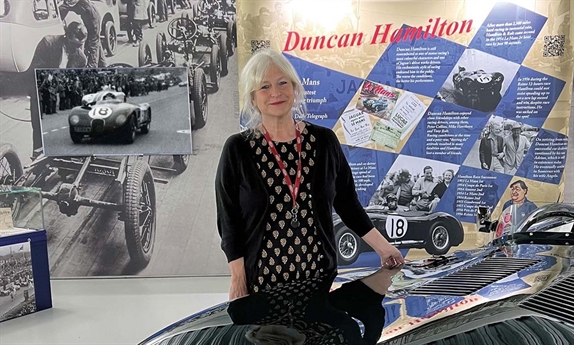
By Lavinia Bentley, Archive Assistant, Jaguar Daimler Heritage Trust, Collections Centre, British Motor Museum
Is starting an apprenticeship in the 60th year of your life a good idea? In my experience the answer is a resounding yes.
Having had three children, all now adults, a 20-year career in nursing, ten years as a sensory panellist in the coffee industry, (tasting coffee for Douwe Egberts – and yes, that was a dream job), I was faced with redundancy when the panel
relocated to mainland Europe.
At a time when my own mother would have reached state pension age, I felt I had one more “good career” in me. My redundancy payment allowed me to consider working at an apprentice rate during training and so when I saw a job advertisement
that really appealed to me, [the hourly rate] offered did not put me off. I wondered how appealing it would be to a school leaver, as it would inevitably mean continuing to live at home, but the upside of an apprenticeship is gaining
a qualification and a route to a degree without the need for a student loan.
My employer was to be the Jaguar Daimler Heritage Trust (JDHT), based at the British Motor Museum at Gaydon. A registered charity with the following mission statement:
“Our purpose is to establish, maintain and promote for the benefit of the nation, the permanent preservation of historic archives, artefacts and motor vehicles manufactured and sold by Jaguar Cars Ltd. (now renamed Jaguar Land Rover
Ltd.) and its predecessor companies under the marquee names of Swallow, SS, Jaguar, Daimler and Lanchester, where such vehicles are of actual potential historic, scientific importance and educational value.”
My position was Archive Apprentice. The job role would be to assist with all aspects of promoting, managing and preserving the archive material and enabling safe access to its contents for users.
What possessed me to imagine I had the skills and abilities required for this job? The fact that both my parents and my sister had worked in the motor industry for most of their working lives and that the Midlands, where I grew up, was
the beating heart of this industry strangely didn’t occur to me at the time. In retrospect I think this heritage has been helpful in my understanding of the culture surrounding car manufacturing communities. At the time I applied however,
I just loved the idea of looking after “history” and making it available to others, which I think is at the core of an archive service.
My first impression of the archive was the smell, papery, a tiny bit musty, the racking, the sound of the rolling stacks. The beautiful, ordered rows of boxes and the distinctly disordered accessions waiting to have an archivists magic
performed on them.
Museum life is eclectic and unpredictable. Every day is full of visitors, enthusiasts, researchers, often with deep subject knowledge and the archive holds answers they need, the archive apprentice is constantly learning how to facilitate
this.
Confidence
I was extremely lucky to have Joanne Shortland, JDHT’s Head Archivist, to train me. I was never made to feel a mistake was anything other than a learning opportunity and her trust in me gave me the confidence to grow into my role and expand
it. I particularly enjoyed the creative aspects of working in the GLAM. (Galleries, Libraries, Archives and Museums,) sector and was able to mount a small exhibition as part of my End Point Assessment.
I.T. was a huge challenge for me, not having grown up with it as a language or having used it extensively in my previous jobs. I feel it did, and still does hold me back and slow me down, but it has been somewhat de-mystified by helpful
colleagues, friends, family and online search engines!
Achievements
My biggest achievement was passing my City and Guilds mathematics qualification, maths having been a lifelong nemesis, is now a friend I meet every day.
The visits and short placements to a local Library, the Library Stock Service and the Local Authority Archive were invaluable to complement my experience in the rather niche JDHT archive. Kimberly Featherston, my tutor and Joanne were
helpful in suggesting and setting them up.
I would have liked more contact with other apprentices and some in person group learning opportunities, this would have consolidated my self-directed learning. The linking of Skills, Knowledge and Behaviours to assignments was an aspect
I really struggled with and a clear framework for this would also have been helpful.
The online End Point Examination was tough, but my examiner from CILIP was such an encouraging and clear facilitator, it was in the end, quite enjoyable.
What would I say to anyone considering a Library and Archive apprenticeship? Do it! Working in an archive is both a pleasure and a privilege.



